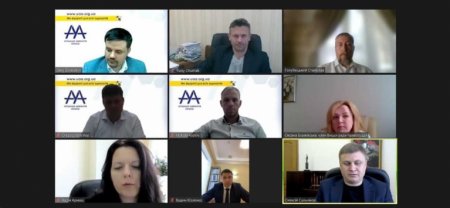Contact center of the Ukrainian Judiciary 044 207-35-46

During the online marathon "Business in the Context of Martial Law", organized by the Ukrainian Bar Association, Speaker-Judge of the Commercial Cassation Court within the Supreme Court Yurii Chumak shared with his colleagues the mechanisms for compensation for damage caused by the military aggression of the Russian Federation.
The first question in recording the destruction of civilian facilities and infrastructure was how to compensate for material and moral damage. One of the real options pointed out by international lawyers is filing lawsuits in foreign jurisdictions. This is important, because if the decision is made and enforced by the international court, it will be possible to foreclose on all the arrested assets of the Russian Federation.
At the same time, the question of how an individual can file such a lawsuit needs to be answered. First of all, this can be done by forcibly displaced persons who went abroad and actually suffered from the war of Russia against Ukraine. Collective lawsuits may be an advantage for Ukrainian citizens in asserting their rights. However, this procedure is complicated by funding and the duration of the entire process.
What can be done in Ukraine? As noted by Yurii Chumak, the Supreme Court has already taken steps to compensate for the damage caused by the aggressive war of the Russian Federation against Ukraine, in particular, in its precedent decision, it expressed a legal position on limiting Russia's judicial immunity.
The problem of the proper collection of evidence of damage or destruction of property remains equally acute. The judge of the Commercial Cassation Court within the Supreme Court stressed that it was necessary to collect the relevant evidence base, conduct examinations, establish the cost of the harm and record the damage caused as soon as possible.
In the context of the Ukrainian courts' decisions, Yurii Chumak said that there would be many issues concerning their recognition and implementation in the territory of foreign states.
"We need to get ready for all these challenges. But in practice, both law enforcement agencies, courts and lawyers should act in this direction, filing legitimate claims. Because the affected people and businesses cannot wait," Yurii Chumak underlined.
Judge of the Criminal Cassation Court within the Supreme Court Stanislav Holubytskyi emphasized that Ukraine had suffered enormous damage due to the destruction of infrastructure facilities of enterprises and organizations as a result of the armed aggression of the Russian Federation, but it was not known yet when they would be compensated. Law enforcement agencies have already registered 25,000 criminal offences related to the war, in particular regarding damage to the specified facilities. "Each case is recorded by law enforcement agencies, appropriate investigations are conducted," said the judge.
The speaker noted that the deliberate destruction by the enemy of infrastructure facilities, including enterprises and organizations, as a result of hostilities, fell under Art. 438 of the Criminal Code of Ukraine "Violation of the laws and customs of war". The Hague Convention on the Laws and Customs of War on Land prohibits the Russian Federation from destroying property belonging to Ukraine during hostilities, and also provides for compensation for damages caused by Russia.
The increase in the number of such crimes boosts the workload on judges. Stanislav Holubytskyi said that the category of cases was new, case law was just emerging, but in considering the cases the courts were guided by the general principles determined by the provisions of criminal and criminal procedural legislation.
Part of the damaged property is located in the occupied territories. Law enforcement agencies do not have access to it and cannot collect any evidence base regarding the value of the property, the circumstances of its damage, etc. In the liberated territories, such evidence is collected in the manner determined by the criminal procedural law. “According to the rules of the Criminal Procedural Code of Ukraine, first an inspection of the scene is carried out, the mechanism of damage is established (either due to an explosion or fire from an explosion, etc.), the degree of damage and, accordingly, the amount of damage caused,” added Stanislav Holubytskyi. The owner of the property may himself calculate the amount of the loss and provide a calculation to the investigator, but in criminal cases forensic economic expertise is mandatory. In addition, photo and video materials can be evidence of damage to property in a criminal case.
Article 128 of the Criminal Procedural Code of Ukraine provides that the injured person has the right to file a civil lawsuit for compensation for the damage caused within the framework of criminal proceedings. The question arises as to who should be the defendant in such a lawsuit. The speaker said that harm was caused mainly by Russian military personnel who followed the instructions of their leadership, and it was not always possible to establish their identity. Even in the case of identification, another question arises as to whether he can be the defendant, given that the initiator of the military aggression was the highest political and military leadership of the Russian Federation.
Today, the possibility of establishing an ad hoc international criminal court (tribunal) to prosecute the political and military leadership of the aggressor country is being discussed. If such a court was created and the relevant persons were really brought to justice, it would be possible to raise questions about the responsibility of the Russian state for the damages caused. The speaker agreed with the opinion that it was appropriate to recover such compensation from the state of the Russian Federation.
“The war has put us in a very difficult situation. The worldview is changing, it is necessary to revise previously concluded international agreements because the Russian Federation does not comply with them, it is necessary to make changes to national legislation, including regarding the procedure for recovering for damages caused by the Russian Federation. We have a lot of issues that require detailed study and discussion,” summed up Stanislav Holubytskyi.